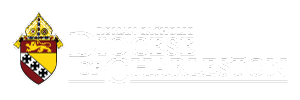by Father Bryan Babick, SL.L.
Belief that the Mass is heaven on earth comes from what Saint John records in the Book of Revelation about his vision of the heavenly Liturgy in which angels and saints sing the constant praises of God by venerating the Lamb. Vatican II’s first constitution, entitled Sacrosanctum Concilium, stated succinctly what had long been held by the Church: “In the earthly Liturgy we take part in a foretaste of that heavenly Liturgy…where Christ is sitting at the right hand of God. We sing a hymn to the Lord’s glory with all the warriors of the heavenly army.”
One could argue that this is simply a pious belief based upon what one Book of the Bible reveals about what Saint John allegedly saw. Therefore we do not really participate in the events of in heaven, but rather we imitate it.
For Catholics this is nonsense. Our faith comes from Jesus’ command to “do this in memory of Me.” Some Christians believe that all we must do to honor Jesus’ memory is to recall His words and actions. There becomes no need for rituals or bread and wine to celebrate Jesus’ memory.
As Catholics, we borrow heavily on the understanding and customs of our Jewish friends, from whom we separated when the Messiah came. For Jews, memory means ‘to participate in actively, as if one was present at the event being remembered.’ For them, an historical event of God’s action is not stuck in the past. Rather it is constantly present in sacred gatherings that celebrate the memory of God’s salvation.
This notion is expressed clearly in the Haggadah which is a collection of instructions detailing the celebration of the Jewish Passover (Seder) meal. The Haggadah says that “in every generation, every Jew must regard himself as though he, personally, was brought out of Egypt.” Clearly the implication is that those who celebrate the Seder meal should consider themselves as having participated in the original Passover. How would our Jewish friends arrive at such an understanding of memory?
It most certainly arises from a reflection on the nature of God. He is infinitely different than humans. In a word, God is infinite while we are finite. For God, to say is to be. That’s why He simply says “Let there be light,” and it shines. His Word requires no further action. His action is never simply isolated in the past, but rather endures as a constant living event. For us, to say “clean” does not make something sparkle. We must act and repeat in order to maintain. When we “remember,” a thought process begins. We must search the brain, albeit imperceptibly, to retrieve a memory and this is a constant occurrence.
As wholly diverse from us, God does not have to search His “mind” to recall. For Him, it is present. Thus when God says He will remember the Covenant He has made, it is not a recollection, but a constant awareness.
When God commands the Israelites to celebrate the Passover, He is asking them to make it present as if subsequent generations were there in Egypt. God’s command to keep a memory did not mean to look back. He was asking His people to make the Passover ever-present.
At the Last Supper Jesus gives a new commandment: “do this in memory of Me.” His followers were Jewish and so “do this in memory” would have had the meaning of doing in future generations what Jesus was doing then as if those future generations were present when Jesus spoke.
If memory means to participate in an event as an ever-present reality, then Sacrosanctum concilium’s teaching that the earthly Liturgy participates in that of heaven makes perfect sense. Jesus’ words “in memory of Me” are like God’s Word – once spoken, it is. When God acts in history, His action never ceases to be. Jesus is “one in being with the Father,” and thus His actions that Holy Week never cease to be. That’s how the Mass can be Holy Thursday, Good Friday, and Easter Sunday all at once.
The Mass is the memory of those realities of our salvation which are made present when we stand before God to sing His praises like those in heaven. Heaven and earth are united because the ever-present memory of Christ feeding us at the Last Supper, dying for us on the Cross, and rising for us on Easter bring us into union with His ever-presence in heaven as the Lamb standing before God. Hence our Liturgical prayer is always asked “through Christ our Lord.” If Jesus’ Word is enough to heal the sick, then it is certainly enough to make His memory present on the altar and usher us into the heavenly court.

